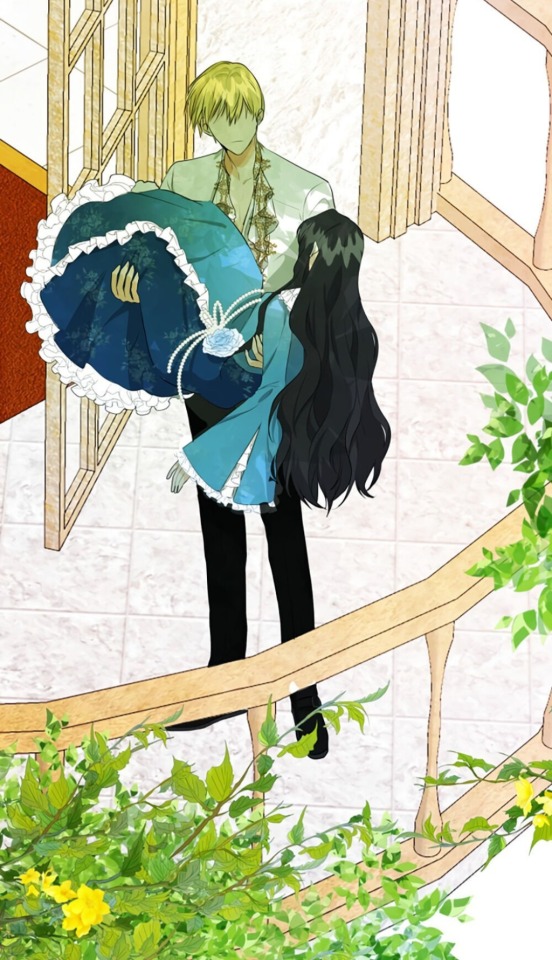#I Became The Wife Of A Tragedy’s Main Lead
Note
Is the trolls practicing fattening up their wives into immobility thing still canon? Cause it’s not on the article anymore? I’d still like to figure out more about this feedism practice though like where it originated and what it symbolizes in troll culture?
This is still canon, I just removed it from the main troll article because it's not really a species-specific thing, it's more of a cultural thing. Not all trolls practice this.
All of today's trolls descend from just two ancient groups: the Skadgrik (of Halostira) and the Hukus (of Wokina). This fattening practice originated with the Skadgrik.
As the Skadgrik travelled away from their native land, they brought their culture to new lands and introduced it to other trolls. The Skadgrik immigrants kept their ancient traditions alive over many generations, and so these traditions spread throughout different trollish societies on Looming Gaia. Their strange wife-fattening practice left a big impression on all who witnessed it, so it became a stereotype of all trolls, even though many troll societies have never done this.
So, why did the Skadgrik fatten their wives in the first place? To answer this, I have to talk about their native homeland first. The Skadgrik come from a frozen island off the coast of Halostira. There is very little food in this region except during migration season, when thousands of walruses use the island as a breeding ground. This season is a time of feasting and abundance for the Skadgrik, who hunt the walruses and preserve their leftover meat in the ice to carry them through the rest of the year.
Hunting and preparing these animals is hard, dangerous work, which is done exclusively by male Skadgrik. In this culture, males are valued by how hard they work and females are valued by how hard they don't work. The Skadgrik believe that for every meal a male eats, he should feed his wife at least double that amount. If he can do this, then he's considered a good provider by his tribe. If he can feed her more than this, then he is exceptional.
So, Skadgrik husbands scramble to feed their wives as much as possible, because the fatter she gets, the more respected he is. Fat, lazy wives are a status symbol in this culture. Many of these trollesses get so fat that they become immobile, and then it becomes her children's duty to care for her while her husband is out huntiung more food.
This tradition may seem strange and cruel to outsiders, but the Skadgrik trollesses are proud to be this big. It's a status symbol for them as much as it is for their husbands. If a trolless is too thin, it gives other Skadgrik a bad impression of her and her family. They think her husband must be a lazy bum, or she's a difficult woman and not worth the hard work, or that she has somehow alienated her children and they refuse to care for her.
Of course, being this big does lead to extra challenges in life. These trollesses don't live very long, usually dying from obesity-related causes like high blood pressure, heart attacks, and diabetes. It also makes them sitting ducks in emergency situations, as they're unable to escape disasters fast enough. They're also prone to devastating falls, bone breaks, and even suffocating under their own weight.
In "Flopper and the Whopper", a Halostiran troll named Xydoz explains what kind of tragedies can happen when their wives get too big. Check out this excerpt:
--
One of the yaks tried to stop and graze. With a whip of the reins, Xydoz urged it back on the trail. Once the laughter died down, Glenvar asked, “Come on, how did ya really get here?”
“Real answer not interesting,” the troll admitted. “Trolls wait until winter when water freeze into bridge, then walk across.” He paused. “Only one time interesting. Heavy troll make ice break. Then swallowed by whopper, gone forever.”
“Is that a joke?”
“Not joke.” Xydoz’ grin faded. “Was Xydoz’ wife, Iiab. Xydoz bad troll, not save Iiab fast enough.”
Glenvar’s grin faded too, curving into a frown. “Oh. I’m sorry,” he said quietly.
The troll lowered his horned head with a small nod. “Iiab was fat, sweaty troll. Smell like a thousand dead fish. Collect most flies in Toraag.”
A slight smile returned to his craggy lips, doleful eyes above. “Iiab so beautiful, Xydoz kill all Iiab’s brothers and father to have wedding.”
“You killed ‘em? Why?” Glenvar flipped over on his belly, resting his chin on his fists.
Xydoz replied, “They not give permission to marry. Say Xydoz not have enough pigs!” His nostrils crinkled. “Xydoz come to Halostira for fortune. One day buy pigs, return to Toraag and marry again. But no troll replace Iiab, lumpiest, foulest, meanest of trolls.”
--
This snippet also gives some insight into trollish beauty standards. Trollish men like their women fat, lumpy-skinned, mean, and smelly! The Skadgrik and their descendants just happen to value weight above other things because food was such a scarce resource for their ancestors. Food didn't come around often, and when it did, they had to risk their lives battling a horde of rutting walruses on a godforsaken chunk of ice to get it.
*
Questions/Comments?
Lore Masterpost
3 notes
·
View notes
Text
I Became The Wife Of A Tragedy’s Main Lead *spoiler-ish*
"Somehow, Alexia got worse??? Godawful translations aside, she puts herself in unnecessarily difficult positions that render her desire to do good useless. And then refuses to explain herself when the doubt cast upon her continues to grow. She continues to make decisions that paint her in a negative light and then has the fucking audacity to be surprised and confused when no one trusts her. Her refusal to communicate can't even be chalked up to childhood trauma because she apparently knew Tervion as a child, and having realized that, she decides to trust him. Except that was a lie because she goes back to doing what she did before only worse. Her whole motivation is to avoid dying like the original novel, but she keeps setting herself up for literal execution for treason on both fucking sides. It's difficult to root for her and I'm honestly not sure if I will keep reading."
#the reading list#best of heretical hot takes#manhwa#webtoon#i became the wife of a tregedy's main lead#i'mma be honest i don't remember this but wow i was heated
0 notes
Text

I Became the Wife of a Tragedy's Main Lead
0 notes
Text
#피폐물 주인공의 부인이 되었습니다#I got married in a hardboiled fiction#Pipyemul Ju-Ingong-Ui Bu-In-I doeeossseubnida#I Became The Wife Of A Tragedy’s Main Lead#KIM Cukdas#김쿠크다스#Nef#네프#Drama#Fantasy#Historical#Isekai#Mature Warning; Gore/blood#Mental / Physical Abuse#Murder / Attempted Murder#Psychological#Romance
0 notes
Text
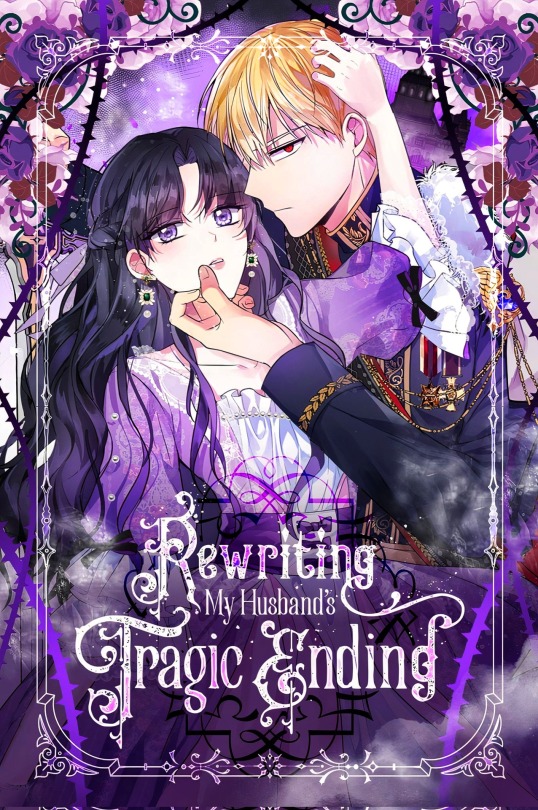
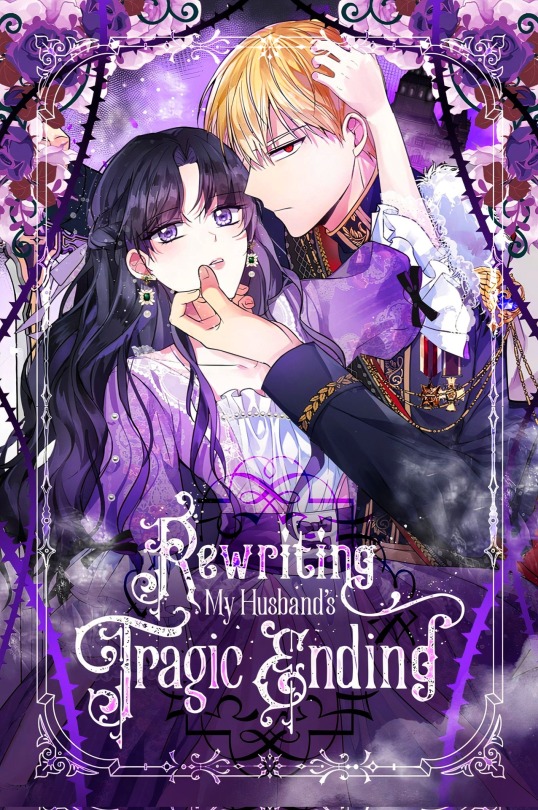
🥀 𝕽𝖊𝖜𝖗𝖎𝖙𝖎𝖓𝖌 𝕸𝖞 𝕳𝖚𝖘𝖇𝖆𝖓𝖉'𝖘 𝕿𝖗𝖆𝖌𝖎𝖈 𝕰𝖓𝖉𝖎𝖓𝖌
#manhwa recommendation#manhwa#webtoon#webtoon recommendation#Rewriting My Husband's Tragic Ending#I Became the Wife of a Tragedy's Main Lead#피폐물 주인공의 부인이 되었습니다
3 notes
·
View notes
Text
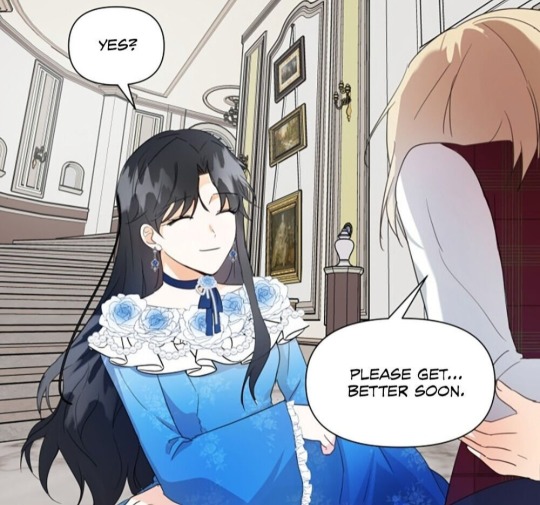


#i became the wife of a tragedy's main lead#I Got Married in a Hardboiled Fiction#shoujo#KIM Cukdas#Nef#manga#mangacap#webtoon#manhwa#manhwacap
6 notes
·
View notes
Text
Russian movies – to understand the complex Russian soul
A short list of movies that are a good place to begin your acquaintance with Russian cinematography.
You're unlikely to find them on Netflix, perhaps on third-party sites and not always with subtitles, but either way - Who seeks, always finds.
The Return (2003)
Andrei Zvyagintsev's drama about a returning father, his sons, and a mysterious box.

A prodigal father (Konstantin Lavronenko) returns to a provincial family and takes his two sons on a camping trip to the lake with vague goals. The debut of an unknown director, shot for little money by a minor producer, suddenly won at the Venice Film Festival.
Peculiarities of the national hunt (1995)
The first part of a triptych about harmless hunters.
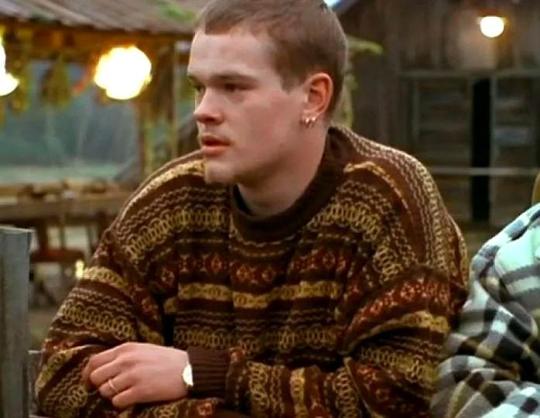
A young Finn (Ville Haapasalo), eager to learn about Russian hunting habits, joins a company gathered in the woods - but all that awaits them ahead is unabated drunkenness. On the one hand, a collection of hysterically funny anecdotes in the "hunting accident" genre, on the other – a study of the national character, judging by the tremendous popularity of the film, more than successful.
Brother (1997)
Alexei Balabanov's crime drama - iconic image of the 90s.
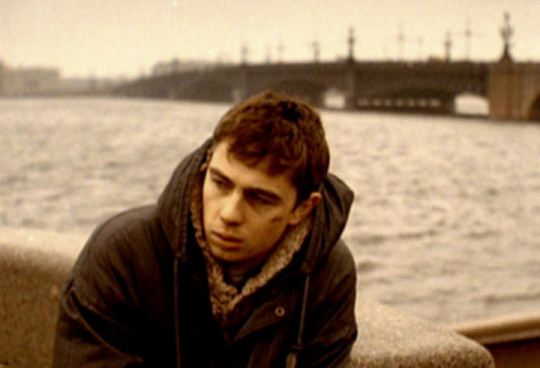
Dembele Danila Bagrov (Sergei Bodrov) arrives in St. Petersburg to visit his brother (Viktor Sukhorukov), who has become a hired killer. "The player is real, but dressed like a sucker", "Beautiful city, but a province", "I don't really like Jews", and, of course, "You're not my brother, you black-assed scum". What can I say - the main Russian film of the 90s. And together with the sequel, even two.
The Island (2006)
A spiritual drama with Mamonov as a monk.

An eccentric old man (Pyotr Mamonov) heals pilgrims and dreams of redeeming the sin committed during the war. Lungin's slightly unexpected, at the time, incursion into God-seeking territory, establishing Mamonov in his new role as Russia's hero. As part of the restoration of spirituality, the film was carried on its hands, showered with awards and shown on Christmas on the central channel.
Hipsters (Stilyagi) (2008)
Todorovsky's retro-musical about the '50s, with songs from the '80s and '90s.

Moscow of the '50s, a Komsomol member (Anton Shagin) falls in love with a fashionable girl (Oksana Akinshina) and becomes a dandy. A sprawling musical with crowd-pleasers, dances, and an unexpected rendition of twisted '80s rock hits. The box office budget, enormous by Russian standards, did not pay off. On the other hand, the film received wide praise in the West, where it was released under the title Hipsters, and Valery Todorovsky became the leading specialist in Soviet retro films a few years later.
What Men Talk About (2010)
Talking play by Quartet I transferred to the motion picture screen.

Not the first, but one of the most popular films, remade from the plays of Moscow's Quartet I. A brief escape from the office routine in the vein of "Stag in Vegas", the music of Bi-2 (the heroes of the entire movie strive to get to the concert of the band, oddly enough, held in the Ukraine), Zhanna Friske and, of course, sex through the eyes of infantile middle-aged men. The result is a great movie about what men in Russia think and talk about.
Leviathan (2014)
Unwashed Russia and an Oscar nomination.

The story of the confrontation between a car mechanic (Alexei Serebryakov) and the mayor of a northern town (Roman Madyanov), who decided to annex the worker's house, in which he lives with his family: his wife (Elena Lyadova) and son. Another parable by Andrei Zvyagintsev about an unwashed Russia in which he decided to cross an ancient tragedy with a domestic drama, for which he won a Golden Globe, a prize for screenplay at Cannes and a nomination for an Oscar. As is often the case with our sharply social statements, cinema has divided society. Not for the first time and, one would think, not for the last.
Loveless (2017)
Andrei Zvyagintsev's psychological thriller.

A divorcing couple (Maryana Spivak and Alexei Rozin) has a son who disappears (Matvey Novikov). They try their best to find him, but the further they go, the more futile their efforts become. Inspired by Bergman's Scenes from a Family Life, Zvyagintsev has created a psychological thriller in which the missing boy acts not only as a Hitchcockian MacGuffin, around whom the plot revolves, but also as the meaning of life that the characters are so feverishly searching for, because everything mattered only when he was around.
Arrhythmia (2017)
The story of two married doctors who missed the meaning of their relationship.
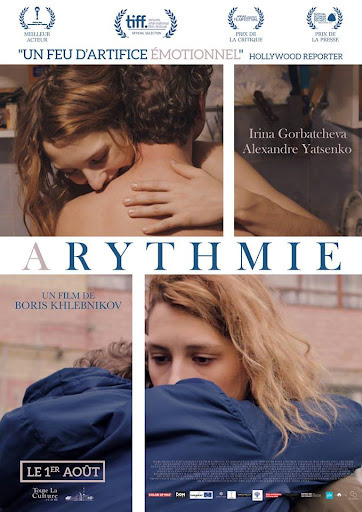
The most sensual film of Boris Khlebnikov's career, which was applauded so wildly at the festival in Sochi, as if every audience member in the audience had really caught the rhythm of this "Arrhythmia." The simple story of two married doctors who, at some point between their daily exploits at work, miss the meaning of their relationship.
188 notes
·
View notes
Note
lan jingyi as lan qiren's son! all of lqr's childrearing points were used up on lxc and lwj leaving ljy as the baby of the family. (jingyi IDOLISES his older brothers (just like in canon))
Lan Qiren had always helped out with raising children at the Cloud Recesses, whenever he could, and the war had only accelerated those habits of his. Accordingly, Lan Wangji wasn’t surprised to see him with a sleeping toddler tucked into his arm, or tucked into a pouch on his back, or even being rocked to sleep in a cradle by his uncle’s Xinfei, a sword which otherwise rarely saw any use.
It was, however, something of a surprise to realize after some time that it was the same toddler.
Lan Wangji asked his uncle about it during one of their tea times.
His uncle had been coming by like clockwork, like a rule, even when Lan Wangji refused to speak a single word to him. After a few months of awkward silences, both of them maintaining their dignity and resolution in their rightness of their own actions that nevertheless yielded to old affection and time, they had slowly started to resemble something like a relationship again.
So he asked, and his uncle looked - almost embarrassed.
“His name is Jingyi,” he said. Lan Qiren would never bow his head and start fiddling with his sleeves the way his more mischievous students would, but for once he looked as if he wanted to. “One of the war orphans – the child of some branch cousins, I believe.”
Lan Wangji did not doubt for a moment that his uncle knew the exact details of Lan Jingjyi’s ancestry, and that he had only introduced uncertainty into the sentence due to his nervousness. But why would his uncle feel nervous about explaining his work with a war orphan?
“I plan to adopt him,” his uncle said.
That was a surprise.
“As a replacement?” Lan Wangji asked, and his uncle flinched as if he’d been bodily struck.
“No,” he said, his voice tight with pain. “Never. Never, Wangji.”
There was that, at least. His uncle still loved him, despite everything Lan Wangji had done to disappoint him – though that wasn’t saying much, really. His uncle had loved their father until the end, even though the man’s decisions had effectively destroyed his life before it had even really started. Through his selfishness, Qingheng-jun had trapped Lan Qiren in the Cloud Recesses as thoroughly as he had trapped his unwilling wife, making Lan Qiren run his sect for him and raise his children for him –
“I always thought you’d get married once we were older,” Lan Wangji said. It had always been impossible before, no matter how renowned or respected his uncle became as a teacher – very few clans would marry their daughters to a man who had all the burdens of leading a sect and none of the benefits, whose children would never inherit absent some new disaster – but surely now that Lan Xichen was managing well on his own..?
An adopted child would make that more difficult.
“Jingyi needs a family,” Lan Qiren said simply.
Lan Wangji wondered if that was why Lan Qiren brought the child here, to the jingshi, rather than simply leaving him with the other young children. To meet him, because they were family.
He wondered if the child would grow up thinking that Lan Wangji was a disappointment, too.
But no – perhaps that was harsh. His uncle tried his best, taught them everything he could, but despite all his efforts it seemed to be the failing of their Lan blood to love too deeply, too selfishly.
Even his uncle.
After all, Lan Wangji could have been – and probably should have been – executed for what he did. Aiding and abetting a mass murderer, allowing him to escape, injuring his own family to do so…justice demanded an answer to that. It demand publicity, shame, and blood paid for in blood.
The punishment his uncle had devised had satisfied the desire for vengeance by most bloodthirsty members of their sect while preserving Lan Wangji’s life and reputation, trading temporary pain – however agonizing – for a future in which Lan Wangji could travel as he willed and do what he wanted.
All that needed to be sacrificed was the trust and love between them.
Another thing his uncle had given up for their sect.
For his family, who he loved as deeply and as selfishly as Lan Wangji had loved, as Qingheng-jun was loved.
(Sometimes Lan Wangji wished that he could break the walls that kept his uncle trapped in the Cloud Recesses, chained by duty and love, the way he wished to have broken the jingshi’s walls that were closed around his mother. But just as he had been too young then, he was too weak now, unable to find a way to unlock the doors and set them all free.)
“He’s a lively child,” Lan Wangji said, out of lack of anything else to say.
His uncle nodded. “I hope that he remains so. Perhaps it is something you can help teach him.”
Lan Wangji looked at his uncle in surprise.
Lan Qiren looked tired and sad, older than he should be. He inclined his head towards Lan Wangji. “I have only ever wanted to raise you to be happy,” he said. “I thought being strict with you would help you avoid –”
He shook his head.
“I do not refuse to learn from the past,” he concluded. “I placed your future above your present, and yet the heavens easily dispose of the plans of men. I will not make the same mistakes again, but I am stubborn and set in my ways – I will need you to help me.”
Lan Wangji’s heart trembled in his chest. “You did a good job, uncle.”
His uncle was strict, but he had been loving – his praise, though rare, was always given with a full heart and pride in his eyes, his pleasure in their progress unfeigned. It was not his uncle that had overly restricted Lan Wangji; it was the rules of their sect that Lan Wangji had followed too strictly and without understanding, learning by rote instead of by heart. It was the rules of the cultivation world that stood against them –
The tragedy ordained by the heavens, that Wei Wuxian would meet the doom that plagued all the blood of those taught by Baosan Sanren, that Lan Wangji would like his father love too much where his love was not returned.
“Strive to constantly improve yourself,” his uncle reminded him, and Lan Wangji nodded.
“Do you also care for A-Yuan?” he asked. He did what he could, given that he couldn’t really move - his injury was too great - but small children could not be raised at a distance, and so someone had to be the main caretaker in his absence. He had assumed his uncle would, but if he was busy with Lan Jingyi…
“Your brother volunteered,” Lan Qiren said solemnly, but there was a faint crinkle to his eyes that spoke of amusement.
“Uncle is caring for A-Yuan,” Lan Wangji concluded.
“Yes, I am,” Lan Qiren acknowledged. “Your brother tried.”
Lan Wangji imagined how it must have gone, and his lips twitched.
“He tried very hard,” his uncle stressed, and Lan Wangji raised his sleeve to his mouth to hide his involuntary chuckle as a cough. “I continue to hope that he will eventually learn to enjoy the company of children.”
It seemed somewhat unlikely.
“Preferably before he has any of his own.”
That seemed – equally unlikely, though Lan Wangji suspected his brother would in fact end up with some children of his own one day, whether through adoption or otherwise.
“We will help him,” Lan Wangji assured his uncle. He thought it would please his uncle, but instead his uncle only looked tired again, and sad.
“Yes,” Lan Qiren said. “Each in our own way, I’m sure.”
#mdzs#lan wangji#lan qiren#my fic#my fics#in which lan jingyi is Sir Not Appearing In This Fic#dulharpa#whistling brook
576 notes
·
View notes
Text
peach’s summer book list
i had a lot of fun compiling the list of books i read during the 20-21 winter, so i decided i would do a summer one as well! i still have a lot of books i own but haven’t read, so im definitely not lacking in material
if you didn’t see my winter list, how my book list works is basically like this: i read a book that i own but have not previously read, write a short summary immediately after finishing the book, write down my thoughts on the book, and then provide a rating for the book. i also might include background info on why i read this particular book/feelings about the author, but that depends on the book. that’s how each entry works
without further ado, let’s get started!
1. Grasshopper Jungle by Andrew Smith
okay so i absolutely adore another book by andrew smith (written after grasshopper jungle) called the alex crow. it’s one of my favorite books of all time, so naturally i wanted to see if grasshopper jungle would make me feel similarly. just like the alex crow, grasshopper jungle’s plot is. so fucking weird. it stars austin szerba, a teenage polish kid who lives in ealing, iowa, and is often sexually confused regarding his girlfriend shann and his best friend robby. and in ealing, iowa, austin and robby accidentally and unknowingly unleash an unstoppable army of huge six-foot-tall praying mantis bugs that only want to do two things: fuck and eat. and i just have to say: andrew smith’s got an absolutely dynamo writing style. alex crow is similar, where it’s a book about kind of everything all at once, framed in a moment centering around teenage boys. it’s fantastic, and it’s more than a little gross, and i love it. this book made me feel so many things, and i thought austin was such an amazing narrator and main character to identify with. this book has it all: shitty teenage boy humor, fucked up science experiments, and poetic imagery that will make you want to cry. and explicit lgbt characters.
412/10 andrew smith what do you put in your water i just want to know
2. Burn by Patrick Ness
patrick ness has written a plethora of some of my favorite books (such as a monster calls, the chaos walking trilogy, and the rest of us just live here) so when i saw this one in the store i knew it would be a great one. burn is an alternate history fantasy that takes place in 1957 frome, washington, during the height of the cold war, and it begins with a girl named sarah and her father hiring a dragon to help out on their farm. but there’s not just dragons, farm living, and cold war tensions; there’s also a really shitty small town cop, a cult of dragon worshippers and their deadly teenage assassin, a pair of fbi agents, and a prophecy that sarah’s newly hired dragon claims she’s a part of. i think eoin colfer’s highfire was on my winter list, which also featured a story that included dragons and shitty cops, so when i first began burn i thought it was funny to have two books that had both things. you know, if you had a nickel etc etc. but that’s really where the similarities end because burn is entirely it’s own monster (dragon). burn is entirely invested in its world, and its fascinating. not only that, i had no clue where the book would take me next. there were so many surprises and amazing twists that honestly just blew me away. this book also includes beautifully written complicated discussions on family, race, and love - it features interracial and queer romances as the two most prominent romance plots which was such a nice surprise from a book i wasn’t expecting to have that kind of representation. this book is witty, fast-paced, and a very heartening read - i absolutely adored it.
9/10 dragons and becoming motivated by the power of love and friendship are so fucking cool
3. As Meat Loves Salt by Maria McCann
i hate this book! as meat loves salt is a historical fiction novel which takes place in seventeenth century england, which is going through a grisly civil war. the protagonist, jacob cullen, is a servant for a wealthy household and is engaged to another servant in the house. but due to certain events that are almost entirely jacob’s fault, he flees the house and is separated from his wife. from there, he joins the royal army and meets a kind soldier, ferris, and the two become fast friends. jacob and ferris’s relationship begins to bridge past friendly, and jacob struggles with his homoerotic feelings as well as the growing obsession and violence inside him. also, they try to start a colony. listen, i don’t know how to describe the book because so much happens, but it basically just follows jacob and all the terrible decisions he makes because he is, truly, a terrible person. ferris is kind and good, and jacob is scum of the earth. he sucks so bad. the entire time i was reading this book (which took absolutely so long), all i wanted was for jacob to just get his ass handed to him. i wanted to see him suffer. and it’s not like i just personally don’t like him - i believe the book purposefully depicts him as unsympathetic even though he is the narrator. i did enjoy the very in depth and accurate portrayal of what life would’ve been like in seventeenth century england, and i think it was interesting to read a character that is just the absolute worst person you’ve ever encountered and see him try and justify his actions, so if you enjoy that kind of thorough writing, then this book would be perfect for you. however, i did not see that bitch ass motherfucker jacob cullen suffer enough. i’d kill him with my bare hands.
2/10 diversity win! the worst man on earth is mlm!
4. This Savage Song by Victoria Schwab
i know ive had a friend tell me how great one of schwab’s other book series is, but truthfully i bought this book because the cover is sick as hell and it was on a table in the store that advertised for buy two get one free, i think. something like that. anyway, this savage song takes place in a future in which monsters, for whatever reason, suddenly became real and out for blood in a mysterious event nicknamed the phenomenon. august flynn is one of these monsters, but he takes no pride in that fact and only wants to feel human. kate harker is the daughter of a ruthless man and is trying her hardest to be ruthless, too, but deep down she knows it’s just an act. their city, verity, stands divided, and kate and august stand on either side - but when august is sent on a mission to befriend kate in the hopes of stopping an all out war, the lines begin to blur. this book rules. august and kate are such interesting and dynamic characters, and the narrative is familiar while still being capable of twisting the story around and taking the feet out from under you in really compelling ways. this savage song is part of the monsters of verity duology, and i can’t wait to dive into how the story continues and finishes.
11/10 sometimes you can judge a book by it’s cover
4a. Our Dark Duet by Victorian Schwab
this is the sequel and finale for this savage song and i’d figure i’d update everyone: fantastic ending, beautiful, showstopping, painful.
12/10 loved it and will definitely be keeping an eye out for schwab’s other books
5. White is for Witching by Helen Oyeyemi
oh boy. okay. white is for witching is about a house, and it is about the women who have lived inside of it. when her mother dies abroad, miranda silver begins to act strangely, and there’s nothing her father or her twin brother seem to be able to do about it. she develops an eating disorder and begins to hear voices in the silver family house, converted to a bed and breakfast by miranda’s dad; and she begins to lose herself in the house and the persistent presence of her family legacy. white is for witching switches perspective dizzingly and disorientingly between miranda, her twin eliot, miranda’s friend from school named ore, and the house itself. this story is a horror story as much as it as a tragedy as much as it is a romance as much as it is a bunch of other things. oyeyemi brings race, sexuality, nationality, and family into this story and forces you not to look away. this book is poetry.
(like i mentioned briefly, this book heavily deals with topics of race and closely follows miranda’s eating disorder. read responsibly, and take care of yourselves)
15/10 this book consumed me and i think i’ll have to read it another 10 more times to feel it properly
6. These Violent Delights by Chloe Gong
okay. okay. strap in for a ride. these violent delights is a romeo and juliet style story, taking place in glittering 1920’s shanghai. the city stands divided - not only between the foreign powers encroaching on chinese land, but also between the scarlet gang and the white flowers, who are at the height of a generations-long blood feud. juliette cai, heir to the scarlets, has recently returned from four years abroad and is determined to prove herself ruthless enough to lead. roma montagov, heir to the white flowers, is standing strenuously on his place as next in line due to a slip up four years prior and is desperate to keep hold of his title. and in the midst of juliette and roma’s burning history with each other threatening to combust, an unnatural monster lurks in the waters of shanghai, loosing a madness on scarlets and white flowers alike. this book has it all - scorned ex lovers, political intrigue, deadly monsters, and all set on a glamorous backdrop of the roaring twenties. i absolutely was enraptured by this book and the way it plays around the story of romeo and juliet so well that it easily became it’s own monster, but with the punches and embraces of something classically shakespearan. gong does just an absolutely breathtaking job of fitting this fantastical story amid the larger world of shanghai and the real life historical events that had shaken the city to its core. completely immersive and outstandingly heart racing.
17/10 i was chewing on my fingernails for the last thirty pages and will continue to do so until the sequel is released (our violent ends, 16 nov 21)
7. The Antiques by Kris D’Agostino
you ever heard of the american dysfunctional family story? this is most definitely that. at the same time george westfall’s cancer takes a turn for the worse, a hurricane hits the east coast, and suddenly all at once the issues of his health, the hurricane, and all three of his children’s achingly dysfunctional adult lives are crashing into each other. reunited by george’s death, the westfall siblings have to face their grief, each other, and the problems in their own lives they attempted to put on hold while planning their father’s memorial. this is a nice story about grief and loss and love and somehow finding the humor amidst it all.
(this book does include a depiction of an autistic child who does experience several pretty bad meltdowns due to ignorant people around him not understanding how to cater to his needs. im not an authority on what depictions are or are not harmful, but i do believe this depiction is ultimately loving and well-intended.)
7/10 it made me laugh and cry and was generally one of those books that somehow hit you close to home
8. Fierce Fairytales by Nikita Gill
fierce fairytales is a poetry anthology that reimagines classic fairytales from a modern, feminist viewpoint, acknowledging that the line between hero and villain, monster and damsel, are not as clear cut as the classics try to make you believe. this book also includes illustrations done by the author herself, which i think is really cool. my personal favorite story reimagining was the story of peter pan and captain hook, called ‘boy lost’ which looked at how peter and hook’s relationship began and rotted. all in all, i think this collection of stories had a lot of important things to say and said them in frank, easy to understand poetry and prose.
7/10 beautiful message and pretty prose, but at times a little cliche
and that’s all from the summer! my fall semester starts tomorrow, and overall i feel very good about all the reading i did this summer. i even read four other books not on this list for work! so i definitely feel like i made the most out of my time, and im really glad i was able to read so many stories that made me feel a variety of different things
thanks so much for reading this list, and let me know if you read or have read any of these books and tell me what you think of them!
happy reading<3
#book recs#book rec#book rec list#grasshopper jungle#burn#as meat loves salt#this savage song#monsters of verity#white is for witching#these violent delights#the antiques#fierce fairytales#just like my winter list i did write ever review immediately after finishing the book and i think.#i think here you can really tell what my immediate reactions were based on how the review is written fbfjfjd
55 notes
·
View notes
Text
I decided to finally make a big ole, main post on my TWF Oc Jodie since I did some new art of her, and such!
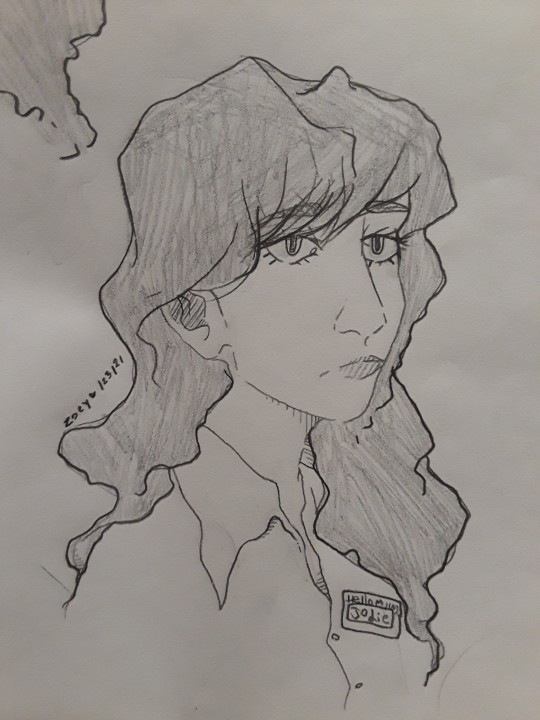
ᴺᵃᵐᵉ: Jodie D. Carpenter .
ᴬᵍᵉ: Forty four; born in 1938 during the late month of April.♈
ᴴᵉⁱᵍʰᵗ: 5'5", sometimes appearing 5'6" .
ᴳᵉⁿᵈᵉʳ: Female; with feminine and gender neutral pronouns
---
ᴬᵖᵖᵉᵃʳᵃⁿᶜᵉ:
Although being forty four, they appear a bit younger on some days and their bubbly attitude that comes out in front of their friends could make one double look, and double guess if they truly were the age they said they were--. Then, there are the other days that hit them, the roughness, that worn down feeling practically oozing onto their features and making them look older, and oh so tired no matter how much they try to hide it. It's from everything, and everything to come. Years of hard work, and years of t r y i n g .
Jodie is a short, petite female with dark, messy brown hair that's long and goes far past their shoulders, and they have very, extremely pale skin with a hint of freckles scattered across. They're seen wearing very chunky, large and oversized clothing. Jeans, and sweaters most of the time with them preferring muted, and dark toned colors like greys, and darker blue shades. She is also seen often more so in their BunnySmiles INC uniform; consisting of a button up top and a long pencil skirt as well as their I.D. card, pinned neatly to the rightside of their chest .

The only thing being, they aren't seen much let alone often enough, being a loner of the sorts outside of those they're forced to see because of their job. Jodie is a male-to-female Transgender person and is ever so slightly open about it, with them leaning towards they/them and she/her pronouns, and they are also on the shorter side compared to most. They wear many different styles of shoes, and slip on sandals to hide it, and to give them an extra inch in their step. Overall, it being yet another thing they do in hopes of blending in with everything, everyone .
ᴾᵉʳˢᵒⁿᵃˡⁱᵗʸ:
A kindhearted person overall--, if meeting properly or ever outside of work, Jodie tends to come off as gentle. They have a very soft, and quiet type of personality with them often keeping to themselves, except for when it comes to them being around their family, and friends. Reserved, and calm. A bit shy, even. A smile, filled with secrets one would think, a lie compared to their reality. False. A mystery, of pain and agony. Someone struggling beyond work, and their desperate need for silence, peace. A moment to themselves. They're a hard worker also, and tend to over work themselves no matter what they seem to be doing, and that has been a trait that had stuck with them ever since they'd been a teen, in college-- and ever since she had started to work for the company in itself .
After the incident leading up to the disappearances, and everything with The Waltens, and the first round of the restaurant closing down, their kindhearted, go-to attitude had sort of withered off in it's own way, and had been replaced with further silence, more of her quiet side. It had lead her to struggle to find work between the relocation project, and the rotting hopes of a revival ever, e v e r fully happening for the restaurant and it's animatronics, and she had eventually pushed the thoughts of it all, everything back into the farthest crevices of her mind until it had been brought back up-- and she had been brought on board to help design more things for the company. Jodie can come off as a bit gruff, a bit intimidating looking far more than she ever is, and their appearance and attitude nowadays is often deceiving compared to how they used to be, and actually really are.
ᴮⁱᵒᵍʳᵃᵖʰʸ:
Jodie had been a slight friend of the Walten family, and the Krankens before they had came to be during their college years, and had been a longtime friend of Linda Thompson at the time before anything, and any of the incidents in the later years had taken place.
Born in Minnesota, with their family and their siblings somehow ending up, and moving to Michigan later on-- they had grown up being an aspiring artist, and had eventually fell into studying the arts, and graphic design for their classes during the years they met Linda, Jack Walten and his wife. It had eventually became a no-brainer of a question if they had wanted to aid in their longtime dreams of their business, and become a part of their restaurant franchise. She had been m o r e than excited to. Soon over time, taking on the job as the company's cartoonist, and mascot designer for the showstoppers, and soon being the partial influence to the iconic pops, and hints of bright color sprawled about the restaurant and it's overall design.
With the constant whirlwind of the hype, and the excitement for them surrounding the opening of Bon's Burgers, it was like watching their words, and their ideas spring to life right in front of them no matter the years it had taken them. Except, it had taken time. Lots, and lots of time. More than they had expected, more than Jodie had expected. They had eventually had families, and had gotten married during the process of it all, the Walten's having their own children even, although throughout the time Jodie had remained mostly single during it all. Focusing more so on her work and such more than anything, and more for the restaurant. The business's creations, their constantly growing, changing ideas. They kept her constantly busy, and they were more than the same when it came to themselves. Spending hours, sometimes weekends at the warehouse. She was one to overwork herself, but never was one to complain. Constantly busy,y e t, happy. Content. Little had she known about the never ending tragedies that would follow, and what BunnySmiles INC., and all the hard work put into it all would cause. Their own dream, A living nightmare that everyone would never be able to escape. That she wouldn't be able to escape.
[Jodie's backstory is written before the accident and before Jack Walten's disappearance; I will be adding more and adding a verse to her bio for after the accident/disappearance soon!]

#the walten files#twf oc#Linda kranken#[sorry for postin about Jodie and my art so much!! ive been drawing lots the past few weeks to kedp my mind off crap and stuff✌🏻💛💛]#[i was going to post this to the main rp blog but decided on posting it here instead!✨]#[shes still a heavy big ole W.I.P but i hope everyone likes her!!]#[i struggled so hard with the thought process of making her a friend of Susan or Linda uGKHKS kgfkKsgj]
26 notes
·
View notes
Note
[smashes down door] who is Bail and why do you like him? I could look it up but I'd rather you gush over him
OH BOY.
So first off, a quick (canon) history lesson: Bail Organa was the Senator and Viceroy (aka Prince Consort) of Alderaan. If you don't know what that means (because old titles are Weird - I'm not judging the only reason I know this is because of this very character), it means that Breha, Bail's wife, is ruling Queen of Alderaan and was the heir to the throne. She married Bail, making him a ruler by marriage, though technically she still held the crown. He, at some point, was also elected Senator of Alderaan, and was Senator leading up to and during The Clone Wars (and after, but we're getting to that).
So Bail, we come to find out, became (best) friends with Padmé Amidala. We see him in a couple of scenes in Attack of the Clones with Padmé, just kinda vibing and making the occasional commentary. We know he stood with her on the Opposition bill (the bill Padmé was nearly killed over at the beginning of AOTC, which was against the formation of a Republic military), though we don't learn much about the rest of his politics until later.
So he's kinda...there, but obvs isn't the focus of the story, and is really just a minor background character. The first real insight we get into Bail is, actually, a really tiny character moment right at the end of AOTC, when Palpatine and some of the Senators are looking down at the Clone troops loading up onto the ship, watching their new military gear up for war.
Bail looks away. While everyone else is staring down at the (slave) army, some of them smiling (like Sheev), some of them just serious, Bail looks away from them and makes this tiny little hand gesture: a simple, closed fist knocking against the banister of the balcony.
It's this, I think, that first piqued my interest in this character. He was the only one not triumphant in that situation. He was the only one who saw things for what they were: a tragedy, and a horror, and that this wasn't something to celebrate but to mourn.
Then we come to Revenge of the Sith, and boy howdy. The man may have like 10 minutes of screen time, but does he make those 10 minutes count!
A quick bullet point of the Important Things Bail Does in ROTS:
When the Jedi Temple is burning, what does Bail do? He flies to it to figure out what's going on and see if he can save anyone. He then watches as a youngling is shot and killed by Clone Troopers, and manages to escape because he's a fucking badass.
Please note, to our knowledge, Bail is the only one who actually goes to check on the Jedi Temple.
As soon as he escapes the Temple, Bail immediately - like immediately - takes his ship and goes to find any surviving Jedi. He is almost certainly the reason both Yoda and Obi-Wan don't walk into the trap that is the Jedi Temple, or are captured - and even if that's not true, he most definitely is the reason they manage to sneak safely onto Coruscant and figure out what happened.
He's the one who rescues Yoda (again) after Yoda's failed duel with Palpatine in the Senate. Which, let me rant about the SYMBOLISM of that for a second please. Because holy shit, the entire duel between Yoda and Palpatine takes place in the Senate, with the Senate building and pods. Here Palpatine proves to Yoda that yes, he is the Senate, he controls it, the new Empire is under his control and no one can stop him. But then - but then - Yoda escapes, and who saves him? Bail. Bail sneaks in with a speeder, saves Yoda, and gets him back to safety. Which is such a huge fucking metaphor for the fact that Bail will be the one who, ultimately, is responsible for Palpatine's defeat. But, more on that later.
Bail is there when Padmé (remember, his best friend) gives birth to Luke and Leia. Bail is literally one of 3 sentients in the galaxy who canonically knows about both Luke and Leia.
Bail instantly offers to adopt one of the children, saying "She will be loved with us." (And then she absolutely is.)
And he does all of that in line 10 minutes of screen time.
He shows up again briefly in Star Wars Rebels, and again in Rogue One, but I'm going to take a trip down a side alley here into a territory that is grossly unused in the SW EU: the founding of the Rebellion.
So we don't actually know much about how the Rebellion got started. What we do know is that Bail was one of the (if not the main) Founders. Bail was the mastermind behind the Rebellion, by all accounts knowing...everything about it: who was who, who did what, where they were located, etc. He knows (and controls) Fulcrum in Rebels, as just one example, and Fulcrum is considered by that text to be one of the most powerful Rebel operatives at the time. In Rogue One (regardless of whether you liked what they did with the Rebellion which, side note, I did not), we see he certainly has a position of great authority and power. People respect him, and listen to him, and he's on an even footing with Mon Mothma (or Mom Mothma as my autocorrect tried to say) who is canonically one of the most powerful people in the Rebellion, according to ROTJ.
More than what he did, though, we can look to his character as a reason I love him. He is a good, kind, honorable man who does (or at least tries) his best. We see again and again, throughout all of SW media he's in, that he consistently chooses the right path, regardless of whether or not it's the easy one. He fights corruption, fights for justice, fights for freedom, fights against tyranny.
He is also, canonically, an amazing father and (according to EU content, since Breha literally doesn't have a spoken line in any media content) an incredible husband. We know he's well-loved by his people, and by the Rebellion, by the extraneous texts and mentions about him in the wake of his death on Alderaan. He's also respected by many Senators during his time in the Clone Wars (Padmé makes a comment in a TCW episode about how he's the best and most respected speaker and Senator she knows), and regardless of how people felt about him after the Rise of the Empire (which is, unfortunately - or fortunately maybe, because I don't trust Disney to do it right - up to headcanon), the fact remains that Bail played an incredibly tricky position as an Imperial Senator, having to balance fighting for his people, the people of the galaxy, and setting up the Rebellion, with not making himself too much of a nuisance, or too much of a traitor, that Palpatine straight up had him executed.
Which, speaking of that, can we also take a moment to appreciate the fact that Bail knew almost every single secret that Palpatine and Vader wanted??? He knew where Obi-Wan was, and possibly where Yoda was. He knew where both of Anakin and Padmé's children were. He knew everything about the fledgling Rebellion. Like...that man, had he been captured and interrogated (and had he broken) would have damned the entire galaxy. Yet he never was. He played his cards perfectly, and was either never suspected, or was able to somehow hide all of the information they wanted to know from being found. Personally, I suspect a mixture of the two.
Furthermore, Bail Organa is a great father and husband. He is directly responsible for Leia being the amazing woman we know and love. The one shot we get of Breha, you can practically see and feel the love and adoration Bail has for her radiating off of him through the screen. Literally the most unproblematic ship in Star Wars. I have never seen a single person say they aren't amazing (unless they just want to break them up to make Bail gay? Which, come on, bisexual and polyamorous people exist, y'all. But that's a talk for another time).
If you're still not convinced, the only thing left that I can say is: I'm a raging lesbian and like, while I definitely wouldn't fuck him, Bail/Jimmy Smits (his actor) is handsome. Have some pictures that I have saved on my phone for when I'm feeling sad.



Tl;dr: Bail Organa is singlehandedly responsible for putting into motion the events that secure the galaxy's freedom, not only by being one of the founding fathers of the Rebellion, but also by reaching Yoda and Obi-Wan before the new Empire can, and getting them safely to Coruscant. He is a good, kind, and noble man who does his best in shitty times, and even if he has to make hard choices, he always makes them for the right reasons. He is a loving father, husband, and ruler, who does right by his people and his family. He fights for what's right, even when that fight is nearly impossible. He's a badass, and arguably a literal genius (you'd have to be, to do the kinds of things he does in canon).
Anyway, Bail Organa is great and I love him - and you should too.
#bail organa#breha organa#leia organa#obi wan kenobi#yoda#padme amidala#sheev palpatine#anyway i love him lots#also for any lotr peeps who read this (or at least are reading the tags)#he's basically elrond in space
878 notes
·
View notes
Text
When I last sat down with Prince Harry for an honest, candid, funny and frank interview, he told me he would use his “privileged position” for “good stuff” for “as long as I can, or until I become boring, or until [Prince] George ends up becoming more interesting.”
Harry, then 31 and one of the most popular royals, seemed aware of his sell-by date. “There’s nothing worse than going through a period in your life where you’re making a massive difference and then suddenly ... you drop off. You want to make a difference but no one’s listening to you.”
Recently it has been almost impossible not to hear Harry, although the jury is out on how much people are still listening. So when he announced last week that at the age of 36 he is writing his “intimate and heartfelt” memoirs, “not as the prince I was born but as the man I have become”, it felt as if Harry thinks his greatest hits are already behind him. After settling in America, why the rush so soon after the soul-baring interview with Oprah Winfrey and a glut of other interventions?
A friend of Harry’s says that while he was still a working royal, he harboured a Prince Andrew complex of slipping down the pecking order and becoming irrelevant: “Harry has always been in such a rush to make an ‘impact’, because he thinks he has a limited shelf-life before the public want to hear more from George and his siblings and he worries that after that, he’ll turn into his uncle.”
Harry now wants to tell us about his “dedication to service” and how he’s “worn many hats over the years”, because “my hope is that in telling my story — the highs and lows, the mistakes, the lessons learnt — I can help show that no matter where we come from, we have more in common than we think.”
The privacy-obsessed prince will let us into his head for a rumoured multimillion-pound advance, with “proceeds” from sales of the book published by Penguin Random House in late 2022, the Queen’s Platinum Jubilee year, going to charity. Harry is said to have been working on a manuscript for more than a year with the American ghostwriter JR Moehringer, who worked on Andre Agassi’s memoir. Whatever is — or isn’t — in the book it is certain to outsell Meghan’s The Bench, which has shifted 6,195 copies here. Yesterday, a spokeswoman for Harry denied reports of a four-book deal, with a second book after the Queen’s death, as “factually inaccurate”, confirming “there is only one memoir planned” and “no project co-ordinated around” the monarch’s demise.
We are likely to hear Harry’s take on the very public breakdown of his parents’ marriage, the impact on his childhood and more on the devastating effects of the death of Diana, Princess of Wales, when he was 12. He has said he failed to deal with it for years, leading to a period of “total chaos” and a near “total breakdown” in his twenties. Of walking behind his mother’s coffin, Harry has said: “I don’t think any child should be asked to do that, under any circumstances.” Will the book reveal who asked him and what choice, if any, he was given?
How Harry chooses to relay the “party prince” years, when he was living it up in London nightclubs and smoking cannabis at his father’s Highgrove home, leading Charles to arrange a visit to a rehab centre, will be fascinating. Will the period be analysed retrospectively as the reeling aftermath of his mother’s tragic death? Or will there be candour about a young, privileged prince having a blast and doing what many young men in his position would have done?
“I never thought he was out of control then,” says a source who knows Harry well. “In his new Californian guise, I think he’ll tell it honestly, framed in the context of his ‘journey’ towards ‘healing’. I think there will be a lot of the old broken me versus the new fixed me who dealt with the pain, and a lot about Meghan as the woman who liberated me to deal with it all.”
A seasoned royal watcher says they are “looking forward to the Vegas chapter”, one of Harry’s most notorious escapades when he was photographed naked playing strip billiards in a Las Vegas hotel suite in 2012 shortly before being deployed to Afghanistan. “Too much army, not enough prince,” Harry later said, admitting: “I let my family down.”
Having become so outspoken on race and “unconscious bias” after meeting Meghan, the first mixed-race woman to marry into the modern royal family, what will Harry tell us he learnt after calling an Asian army colleague “our little P*** friend” while at Sandhurst military academy in 2006? The incident was widely condemned, a year after he was forced to apologise for wearing a Nazi uniform to a fancy dress party. “He’ll be smart enough to know that to gloss over those incidents would undermine the book,” says a royal source who knows him.
Harry’s account of family life will be intriguing — how the triumphant trio of William, Kate and Harry briefly became the “Fab Four” with Meghan, their fairytale wedding with the no-show by Thomas Markle, the father-in-law he has never met, William and Harry’s rift, the painful split from the royal family and their new life in America, right up to the controversy last month surrounding the naming of their new daughter, Lilibet. The Sussexes called in lawyers to dispute a BBC report that the Queen was “not asked” about the intimate nickname. “False and defamatory” said team Sussex. The BBC stood by the story. Buckingham Palace did not dispute it.
What will Harry’s version of life inside and outside the royal goldfish bowl look like? He has pledged total honesty, and is “excited for people to read a first-hand account of my life that’s accurate and wholly truthful”. But as the Queen’s statement following the bombshell Oprah interview in March pointed out, “some recollections may vary”.
In that interview, and in the mental health documentary series Harry made with Winfrey, he claimed talking about mental health with his family was off-limits. Royal life “wasn’t an environment where I was encouraged to talk about it”. His comments left some scratching their heads. After all, Harry, William and Kate championed ending the stigma around mental health for years in their hugely successful Heads Together campaign.
On the Armchair Expert podcast in May, Harry also credited “a conversation I had with my now-wife” for his decision to have therapy. Yet in another podcast in 2017, Harry said he sought professional help “three years ago” encouraged by William, who told him: “You really need to deal with this.” The inconsistencies in some of Harry’s recent recollections have been well documented, leading some to describe him as a “revisionist historian”. Harry’s rumoured ghostwriter has spoken about the importance of honesty.
There is little hope in royal circles that will happen. The Sussexes’ recent outbursts have driven once-loyal aides to despair. “I fear they may sail into the sunset now, convinced they did the right thing by speaking ‘their truth’,” says one. “Now I hope everyone shuts the f*** up.”
Charles has been portrayed as an emotionally and financially stingy parent. A source close to him says: “He has genuinely been so upset by it all. He just doesn’t recognise any of the examples or narrative.” Friends of William and Harry say William, who was forced to publicly defend his family against accusations of racism after the interview with Winfrey, “despairs” of his brother but the shock factor is wearing off.
Harry has done brilliant things in his time. Moving the dial on mental health, serving his country at war and launching the Invictus Games are just a few of his achievements. Nobody should begrudge him wanting to bang the drum there, and if he wants to bare his soul on how he has coped with undeniable adversity and tragedy in his life, fair enough. But if his book becomes the main course of a score-settling feast then he will lose many more hearts and his greatest fear will be realised — “no one is listening”.
23 notes
·
View notes
Text

Top 5 Reasons Javier Garcia’s Pretty Great
Of all the games in TWDG, A New Frontier seems to get the most shit. Stick around this fandom long enough and that’ll become apparently pretty quick, especially on other platforms such as reddit and instagram... and y’know, I get it. ANF is far from perfect, parts of the storyline go no where and characters don’t get the development they should have, a lot of people were upset that Clementine wasn’t the main playable protagonist, and certain character models look like... well, they look like potatoes.
Hell, I’ve talked to some people who flat out say they don’t even consider ANF as part of the canon and skip it when they replay the series, which.... harsh, but you do you. However, if you do skip over ANF for whatever personal reasons you have, you are missing out on what I would consider the best part of that game: Javier Garcia.
I love Javi, and I will stand by the fact that he’s a pretty damn good playable protagonist. I just wish more love and time was put into developing ANF to give him an even better story but y’know... Telltale was goin’ through shit, so we got this...
But, I still wanna talk about how great I think Javi is so c’mon, let’s take a walk.
5. Javi’s relationship with David
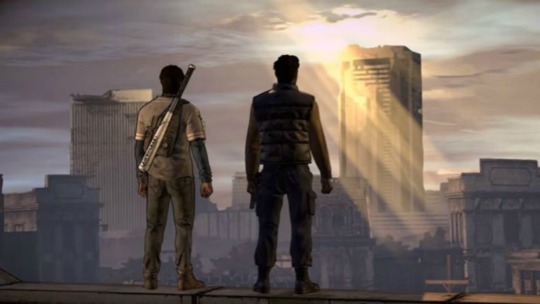
Now this might come off as a weird one, especially if your Javi has a more hostile relationship with David. Even so, I find the dynamic between Javi and David to be one of the more compelling aspects of ANF and I wish it was more front and center than it is but y’know.
So we got Javi, who is the younger, more irresponsible brother who became this hotshot baseball star only to lose it all by gambling. Then you got older brother David who is a military man with a couple kids and a second wife, and he’s always felt a little overshadowed by Javi. This creates this dynamic of brothers who do love each other, but don’t always know how to communicate and confide in one another and it can lead to a lot of tension or hostility.
The route I usually take with a Javier who tries his best with David, who wants this connection despite everything, who made the promise to their father to look out for David and be there for him, to stand with him when he needs it, y’know?
Some stand out moments for me is during the baseball flashback when David’s trying to open up about something, but struggles because Javi isn’t taking a hint about the serious nature, when they stand together on the roof, and the last conversation we see between them if David survives.
Oh, and ya can’t forget the “I love you”’s when David is two seconds away from murdering Javi... that’s the good shit.
And y’know, on the flip side where Javi is against David every step of the way, you can still argue that acts as a more tragic yet compelling story of two brothers who never saw eye to eye, never tried to, and it ended in tragedy... I personally don’t prefer this route, but to each their own.
Again, this is at #5 because it’s not handled the greatest and it’s a bit of an unpopular choice.... but I don’t care, Javi and his relationship with David is one of my favorites.
4. He’s pretty charming, isn’t he?
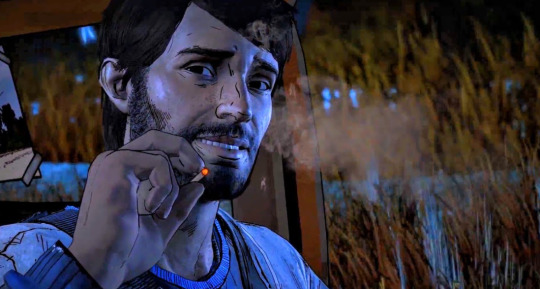
I’m sorry, I can’t help it.... if a charming character can make me laugh, then I almost always end up loving them. Javier Garcia is so damn funny and I love him for it.
Yeah, ANF is a mess but this dude makes it so much better with his dialogue, a great performance by Jeff Schine, great facial expressions, and just an overall charismatic air around him.
He’s just super likable, okay? Even when you play him as a total bastard, I have a hard time not enjoying his presence. I’ll be honest, if Javi wasn’t the playable protagonist or if he was this bland, watered down version of himself... I might be one of those people who skip over ANF.
He’s easily one of my favorite parts of this game and one of the few redeeming things about it.
3. His growth as a character
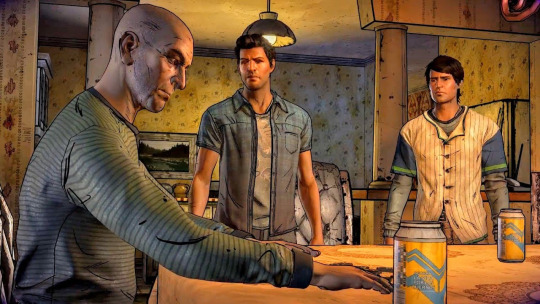
Like I mentioned in #5, when we first meet Javi he’s this irresponsible ex-professional baseball player who wasn’t around, even though his father was dying from cancer. After his father dies and he runs to try and make it home in time... he’s too late and David and their mother are pretty upset with him.
And then his father turns into a walker, and the apocalypse happens. Javi is now trying to survive with Kate, Gabe, and Mariana while everything goes to hell around them. But for someone known to not be around or to skip out when things get a little tough, Javi doesn’t abandon them. Nope, he stays with them for years, traveling around and surviving, making sure they have what they need.
By the end of the game? Javi’s proved to be a leader, proved that he’s better than he once was. Again, this is ANF so this growth isn’t super smooth or the greatest, but damn it, Javi makes it work.
He and his family, no matter the combo you got, are staying in Richmond and they’re going to try to start over and rebuild it, make it better than it was.... which I can only assume they succeeded because after that they were never heard from again.
Also, Javi is constantly having shit thrown his way and somehow he manages to pull through.
So good job, Javi, you did it.
2. Javi’s got a lot of force
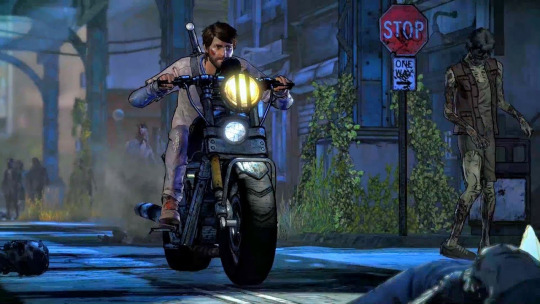
Listen... Javi is so fun to play as. Like okay, I know that Telltale games don’t have the most complex combat system... you literally just push the buttons as they appear on screen. But I don’t care because Javi makes that fun.
Javi really puts all of his weight into each hit and you feel it. I don’t know how to explain it, but there’s something satisfying about the way Javi fights with a melee weapon, and it’s not something you feel when you play as Lee or Clementine. You do get it a few times when you place as Michonne in the mini-series, but even then, I would argue that Javi did it better.
It’s especially prominent towards the end of ep5 if you go after David and Gabe, and Javi’s on this motorcycle with his damn bat knocking over walker after walker until he finds them... then you get all this intense force when Javi is just gunning and beating down walker after walker to get to the vehicle Gabe and David are trapped in. I love it so much, it’s easily one of my favorite moments in ANF.
Don’t get me wrong, I have fun playing as Lee and Clementine, but Javier Garcia hits different, y’know?
1. He’s really trying his best to care for everyone, okay?
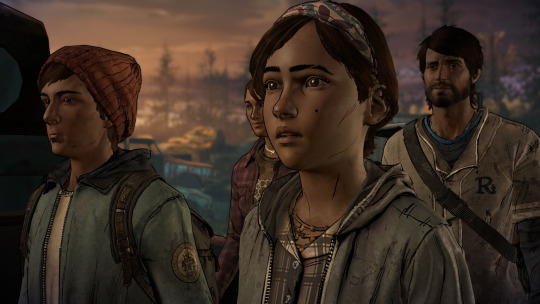
When we think of Lee as a playable protagonist, we tend to think about how wise he was, how he always seemed to know what he was doing and how much he was willing to sacrifice for Clementine... and when we think of Clem as a playable protagonist in S2, we’ve got this sad little girl who gets punished no matter what she does, she’s smart and often underestimated, but she makes plenty of mistakes which she learns from.
And then we have Javi who has a bit of both in him. He’s older and can have his moments of wisdom [like with Gabe and Clem] but he also has plenty of mistakes he’s gotta learn from and sometimes no matter what he does, everything goes to hell... but Javi does manage to stand out on his own among these two.
Javi does what he can, he tries his hardest to look after these kids even though he never planned to be a father figure, he works with Kate to make sure they’re safe. When he fucks up, he tries to make things right... even though it doesn’t always work out. He loves Gabe and Mariana, and you can see and feel his heartbreak when he’s the one to bury Mari after she’s killed.... and now he has Gabe, who’s hurting, and he does what he can to make sure he doesn’t meet the same fate which.... sometimes doesn’t work out depending on your ending.
I just-- he’s trying, okay? Javi is trying his best and I love him for it.
---
Honorable Mentions
-Javi has some of the best deaths/fails moments... seriously, I could watch him confidently run right into those metal stairs and fall to his doom a hundred times.
-He’s a literal disaster bi.
-He fucking loves pudding and I mean, who doesn’t? Y’know?
-His bromance with Tripp is pretty good until Tripp dies for death quota reasons.
---
So what are your thoughts on Javier Garcia? Do you agree with these reasons, or do you have any to add? Lemme know, it’s always fun to have character discussions.
Have any suggestions for future T5F’s? Feel free to send ‘em in! :D
Next week’s T5F

39 notes
·
View notes
Text
19th March 1286: “A Strong Wind Will Be Heard in Scotland”
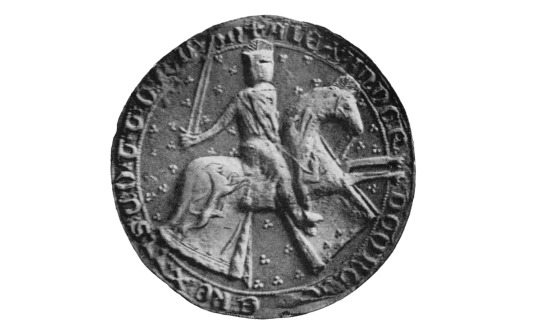
(Image source: Wikimedia Commons)
On 19th March 1286, a body was discovered on a Fife beach, not far from the royal burgh of Kinghorn. The corpse was that of a 44-year-old man, and the cause of death was later diversely reported as either a broken neck or some other severe injury consistent with a fall from a horse at some point during the previous night. It is not known exactly when this body was found, nor do we know who discovered it. But we do know that the dead man was soon identified, with much dismay, as the King of Scots himself, Alexander III.
The late king had no surviving children, only a young widow who was not yet known to be pregnant, and an infant granddaughter in the kingdom of Norway. Despite this, Alexander III’s untimely death did not cause any immediate civil strife, although it did set in motion a chain of events which eventually led to the Scottish Wars of Independence. This conflict would forever alter the relationship between the kingdoms of Scotland and England, as well as the wider course of European history.
Although Alexander III was a moderately successful monarch, he had been unfortunate over the last ten years. His first wife, Margaret of England, had died in 1275 and Alexander initially showed no immediate interest in remarriage. At first the succession seemed secure: Margaret had left behind two sons and a daughter. However the death of the couple’s younger son David c.1281, may have prompted the king’s decision to arrange the marriages of his two surviving children over the next few years. In the summer of 1281, the twenty-year-old Princess Margaret set sail for Bergen, where she was to marry King Eirik II of Norway. Her brother Alexander, the eighteen-year-old heir to the throne, married the Count of Flanders’ daughter in November 1282. Neither marriage lasted long. The queen of Norway died in spring 1283, possibly during childbirth, while her younger brother succumbed to illness in January 1284. Within a few years, a series of unforeseen tragedies had destroyed Alexander III’s family and hopes, and the outlook for the kingdom seemed equally bleak...
All was not lost however. The king was in good health and believed he could count on the support of the realm’s leading men. Steps were swiftly taken to ensure their compliance with his plans for the succession. On 5th February 1284, a few weeks after Prince Alexander’s death, an impressive number of Scottish nobles* set their seals to an agreement at Scone. In the event of the king of Scotland’s death without any surviving legitimate children, they obliged themselves and their heirs to accept as monarch the heir at law. This was currently a baby named Margaret, the only surviving child of Alexander III’s daughter the queen of Norway.
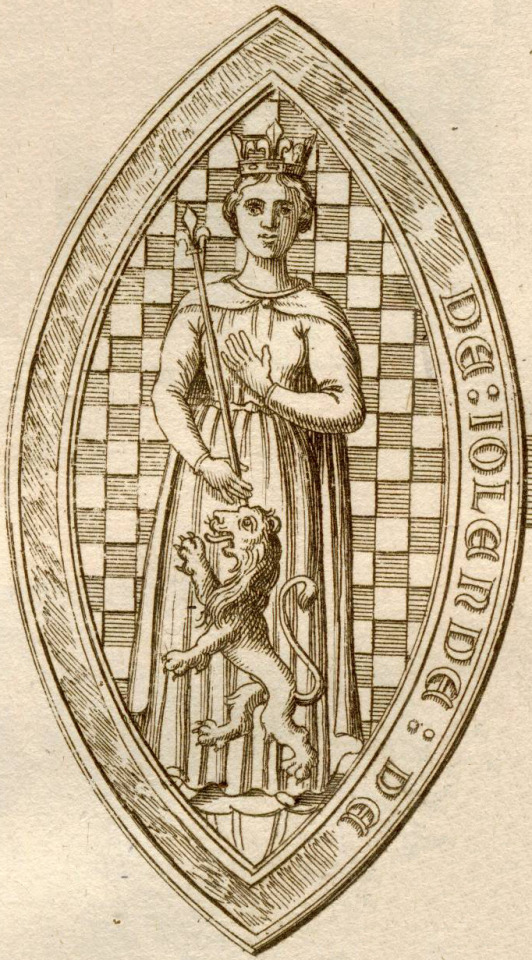
(Drawing based on a seal belonging to Yolande of Dreux, Alexander III’s second queen. She later became Countess of Montfort and, by marriage, Duchess of Brittany. Source: Wikimedia Commons)
Although the bishops of Scotland were to censure anyone who broke this oath, the prospect of the crown being inherited by an infant girl on the other side of the North Sea was obviously not ideal. Her grandfather struck an optimistic note in a letter to his brother-in-law Edward I of England, writing that in spite of his recent “intolerable” trials, “the child of his dearest daughter” still lived and hoping that “much good may yet be in store”. But the king would not leave everything up to chance and in October 1285, at the age of 43, he married the French noblewoman Yolande of Dreux. As the year drew to a close, Alexander might have hoped that his misfortunes were behind him. He still had his kingdom and his health, and now, with a new queen, there was every chance that he could father another son.
In fact, the king had less than six months to live. The exact circumstances of Alexander’s death are shrouded in mystery, although most sources agree on the fundamental details. Only the Chronicle of Lanercost gives a detailed account, although much cannot be corroborated, and its author had a habit of providing moral explanations for historical events. He was convinced that the calamities which befell the Scottish royal house in the 1280s were punishment for Alexander III’s personal sins. The chronicler never explicitly names these sins, but he does hint at a conflict between the king and the monks of Durham (allowing Alexander’s death to be attributed to a vengeful St Cuthbert). The chronicler also included salacious stories of Alexander’s private life, claiming:
“he used never to forbear on account of season or storm, nor for perils of flood or rocky cliffs, but would visit, not too creditably, matrons and nuns, virgins and widows, by day or by night as the fancy seized him, sometimes in disguise, often accompanied by a single follower.”
Although this does seem to back up the king’s habit of making reckless journeys, alone and in bad weather, the chronicle’s biases are nonetheless fairly obvious. On the other hand, the man who probably compiled the chronicle up to the year 1297 does appear to have had many contacts in Scotland. These included the confessors of the late Queen Margaret and her son Prince Alexander, as well as the latter’s tutor, the clergy of Haddington and Berwick, and the earl of Dunbar. It is unclear how he acquired information about Alexander III’s death, but the chronicle’s narrative is at least plausible and correct in its essentials. Although some of the anecdotes are a little too detailed and didactic to be entirely truthful, the narrative provides some interesting insights into contemporary behaviour, such as the way medieval Scots felt entitled to address their kings. In the absence of alternative narratives, and without necessarily subscribing to the chronicler’s moral views, it is therefore perhaps worth following Lanercost to begin with, supplementing this with additional information where possible.
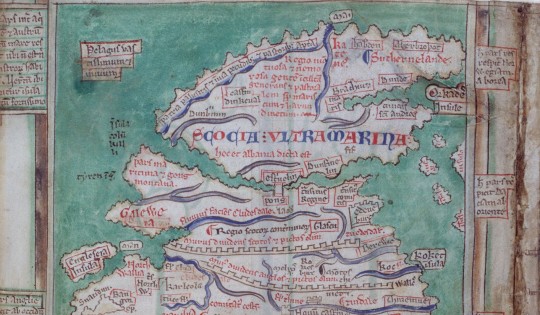
(The northern half of a map of Britain, drawn by the thirteenth century English chronicler Matthew Paris. Matthew Paris was based in the south of England and was not overly familiar with Scottish geography, but his depiction of Scotland as split over two islands and joined only at the bridge of Stirling, is nonetheless enlightening. The map is now in the public domain and has been made available by the British Libary (x))
On the evening of 18th March 1286, Alexander III is reported to have been in good spirits. This was in spite of the weather, which the author of the Chronicle of Lanercost described as being so foul, “that to me and most men, it seemed disagreeable to expose one’s face to the north wind, rain and snow”. The king of Scots was then dining at Edinburgh, attended by many of his nobles, who were preparing a response to the king of England’s ambassadors regarding the aged prisoner Thomas of Galloway. However when the court had finished dinner King Alexander was not at all anxious to retire early. Instead, not in the least deterred by the wind and rain lashing the windows, he announced his intention of spending the night with his new wife. Since Queen Yolande was then staying at Kinghorn in Fife, travelling there from Edinburgh would not only involve riding over twenty miles in the dark, but would also mean crossing the choppy waters of the Firth of Forth. Unsurprisingly, the king’s councillors tried to dissuade him. However Alexander was determined, and eventually he set off with only a few attendants, leaving his courtiers wringing their hands behind him.
The first part of the journey passed without incident and soon the king and his companions arrived at the Queen’s Ferry, by the shores of the Forth. This popular crossing point was named after Alexander’s famous ancestress St Margaret, who had established accommodation and transport for pilgrims there two hundred years earlier. But when the king himself sought passage, the ferryman pointed out that it would be very dangerous to attempt the crossing in such conditions. Alexander, undeterred, asked him if he was scared, to which the ferryman is said to have stoutly replied, “By no means, it would be a great honour to share the fate of your father’s son.” So the king and his attendants boarded the ferry and, notwithstanding the storm, the boat soon reached the shores of Fife in safety. As the king and his squires rode away from the ferry port, intending to complete the last eleven or so miles of their journey that night, they passed through the royal burgh of Inverkeithing. There, despite the evening gloom, the king’s voice was recognised by the manager of his saltpans, who was also one of the baillies of the town.** The burgess called out to the king and reprimanded him for his habit of riding abroad at night, inviting Alexander to stay with him until morning. But, laughing, Alexander dismissed his concerns and, asking only for some local serfs to act as guides, he rode off into the night.
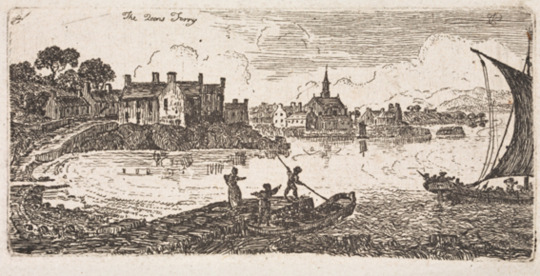
(South Queensferry, as drawn by the eighteenth century artist John Clerk and made available for public use by the National Galleries of Scotland. Obviously the Queen’s Ferry changed a lot between the 1280s and the 1700s, but at least during this period the ferry was still the main mode of transportation across the Forth.)
By now darkness had set in and, despite the local knowledge of their guides, it was not long before every member of the king’s party became completely lost. Although they had become separated, the king’s squires eventually found the road again. However at some point they must have realised that they had a new problem: the king was nowhere to be found.
In the early fifteenth century, local tradition held that Alexander was at least heading in the right direction when he became separated from his companions. Although he too had lost sight of the main road, the king followed the shoreline, his horse carrying him swiftly over the sands towards Kinghorn. It was there, only a couple of miles from his destination, that the king’s luck finally ran out. Since there were no known witnesses to Alexander III’s death, it is unlikely that we will ever know for certain what happened that night. However most sources agree that the king’s horse probably stumbled and threw its rider. Alexander tumbled to the ground and snapped his neck and, at a stroke, the dynasty which had ruled Scotland for over two hundred years came to an end.
It is not known precisely how long the king’s body lay on the beach, alone under the moon while the waves crashed on the shore and confusion reigned among his squires and guides. However his corpse was discovered the next day and was swiftly conveyed to nearby Dunfermline. Ten days later, on 29th March 1286, the kingdom’s ruling elite gathered to see the last King Alexander buried near the high altar of the abbey kirk, in the company of his ancestors. Near the spot where the king’s body was allegedly found, a stone cross was later erected beside the road, which could still be seen by travellers over a hundred years later. The modern belief that Alexander III died when either he or his horse fell from a cliff*** (a tradition which is not supported by any mediaeval sources so far as I am aware) may stem from the position of this old cross, which possibly occupied the same spot as that of the Victorian Alexander III monument. This monument can now be seen at the side of the modern A921 road between Burntisland and Kinghorn, a permanent reminder of the role this seemingly nondescript location once played in the history of Scotland.

(The Alexander III monument near Kinghorn. Source: Wikimedia Commons- the photo was taken by Kim Traynor who has kindly made the image available for reuse under the Creative Commons Attribution-Share Alike 3.0 Unported license).
The impact of Alexander’s death on a small mediaeval kingdom like Scotland, conditioned to look to its monarch for leadership, must have been great. Even the Lanercost chronicler admitted that the general populace was observed “bewailing his sudden death as deeply as the desolation of the realm.” However it is important not to exaggerate the scale of the crisis. Popular views of Alexander III’s death are inescapably informed by the accounts of fourteenth and fifteenth century writers, who depicted it as the root of all of Scotland’s later ills.
Writing in the aftermath of a century dominated by war, plague, famine, and climate change, it is perhaps unsurprising that many late mediaeval chroniclers looked back on Alexander III’s reign as comparatively peaceful. As the author of the fourteenth century “Gesta Annalia II” explained, “How worthy of tears and how hurtful his death was to the kingdom of Scotland is plainly shown forth by the evils of after times.” Meanwhile, in his “Orygynale Cronykil of Scotland” completed c.1420, Andrew Wyntoun portrayed Alexander’s reign as a Golden Age of peace and justice (when, just as importantly, oats only cost fourpence a boll). He incorporated an old song into his chronicle, perhaps written in the years following the king’s accident, which neatly encapsulates later views of the event and its impact:
“Quhen Alysandyr oure Kyng wes dede
That Scotland led in luẅe and lé,
Away wes sons off ale and brede,
Off wyne and wax, off gamyn and glé:
Oure gold wes changyd in to lede.
Cryste borne in to Vyrgynyté,
Succoure Scotland and remede,
That stad [is in] perplexyté.”
Wyntoun’s younger contemporary Walter Bower, author of the “Scotichronicon”, also lamented Alexander’s premature death and even rolled out a legend about Scotland’s famous seer, Thomas the Rhymer, to reinforce his point. On 18th March 1286, he claimed, the earl of Dunbar “half-jesting” asked the Rhymer for the next day’s weather forecast. True Thomas answered gloomily:
“Alas for tomorrow, a day of calamity and misery! Because before the stroke of twelve a strong wind will be heard in Scotland, the like of which has not been known since long ago. Indeed its blast will dumbfound the nations and render senseless those who hear it, it will humble what is lofty and raze what is unbending to the ground.”
The next morning came and went without any gales, so the earl decided that Thomas had gone mad- until a messenger arrived at precisely midday with news of the king’s death. Although Bower may have been attempting to bolster Thomas of Erceldoune’s reputation as a prophet (in response to English propagandic use of Merlin’s prophecies), the anecdote reveals the significance he attached to Alexander III’s death. Similarly for John Barbour, author of the fourteenth century romance “The Bruce”, there was no doubt that the story of his hero’s story began, “Quhen Alexander the king was deid / That Scotland haid to steyr and leid.” Following this, Barbour skips ahead to the selection of John Balliol as king, dismissing the six years in between as a time when the country lay “desolate”. In this way later chroniclers created the impression of an Alexandrian ‘Golden Age’ and that Scotland almost immediately descended into chaos after his death. Though understandable, these late mediaeval interpretations have traditionally hampered analysis of Alexander’s reign and the events of the decade following his death, despite the best efforts of modern historians.
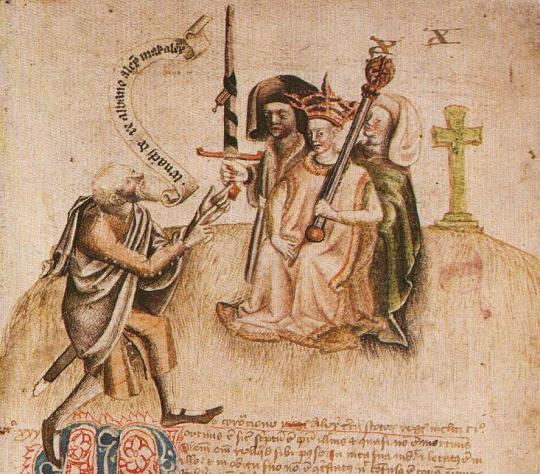
(The coronation of the young Alexander III at Scone, as depicted in a manuscript version of the fifteenth century “Scotichronicon”, compiled by the Abbot of Incholm, Walter Bower. Source: Wikimedia Commons)
In reality, while the king’s death was undoubtedly a deep blow, the Scottish political community rallied in the immediate aftermath. In April 1286, parliament assembled at Scone and promised to keep the peace on behalf of the rightful heir to the kingdom. Six ‘Guardians’ were to govern in the meantime- two bishops (William Fraser of St Andrews and Robert Wishart of Glasgow), two earls (Alexander Comyn, earl of Buchan and Duncan, earl of Fife), and two barons (John Comyn of Badenoch and James the Steward). Despite the oaths sworn to Margaret of Norway two years earlier, there may have been some doubt as to who the “rightful heir” actually was. Certain sources claim that Alexander III’s widow Yolande of Dreux was pregnant and the political community waited anxiously for several months before the queen gave birth in November 1286. However no male heir materialised**** and by the end of the year it seems to have been generally acknowledged that the three-year-old Maid of Norway was the rightful “Lady of Scotland”. She was destined never to set foot in Scotland, but, despite her age, gender, and absence from the realm, the country did not descend into complete anarchy in the four years when she was the accepted heir to the throne. Undoubtedly there were people who had reservations about her reign: the Bruces, for example, seem to have attempted a short-lived rebellion, though the situation was soon defused by the Guardians. By 1289 the cracks were perhaps beginning to show, with the death of the earl of Buchan and the murder of the earl of Fife removing two Guardians, who were not replaced. Nonetheless, the authority of the Guardians was recognised in the absence of an adult ruler and they generally attempted to govern competently in the four years between Alexander III’s accident and the Maid of Norway’s own death in 1290.
Having received news of this second tragedy, the Guardians again acted cautiously, deciding that rival claims for the kingship should be judged in an official court chaired by a respected and powerful arbitrator. Thus they appealed to Scotland’s formidable neighbour, Edward I of England. Despite later allegations of foul play, the English king’s eventual judgement in favour of John Balliol does appear to have been consistent with the law of primogeniture and due process. It would take years of steady deterioration before war finally broke out in 1296. By then Alexander III had been dead for a decade, and though the crisis may have indirectly grown out of his demise, it was not necessarily the immediate cause of Scotland’s late mediaeval woes. Nonetheless the events of that dark night in March 1286 would leave their mark on the popular imagination for centuries, shaping Scottish history down to the present day.
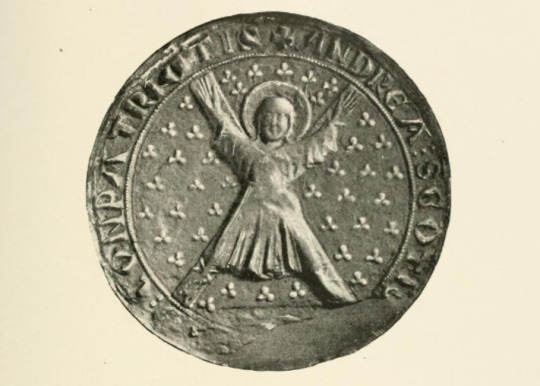
(An imprint of the Great Seal used by the Guardians of Scotland following Alexander III’s death. Reproduced in the “History of Scottish seals from the eleventh to the seventeenth century”, by Walter de Gray Birch, now out of copyright and available on internet archive)
Additional Notes:
*The assembled magnates included the earls of Buchan, Dunbar, Strathearn, Atholl, Lennox, Carrick, Mar, Angus, Menteith, Ross, Sutherland, and two other earls whose titles are illegible but who may have been Caithness and Fife. The barons included Robert de Brus the elder (father of the earl of Carrick and grandfather of the future Robert I), James Stewart, John Balliol (the future king), John Comyn of Badenoch, William de Soules, Enguerrand de Coucy (Alexander III’s maternal cousin), William Murray, Reginald le Cheyne, William de St Clair, Richard Siward, William of Brechin, Nicholas de Hay, Henry de Graham, Ingelram de Balliol, Alan the son of the earl, Reginald Cheyne the younger, (John?) de Lindsay, Simon Fraser, Alexander MacDougall of Argyll, Angus MacDonald, and Alan MacRuairi, among others.
** The historian G.W.S. Barrow identified this figure as Alexander the saucier the master of the royal sauce kitchen and one of the baillies of Inverkeithing.
*** There are some variations on this local tradition too- in 1794, the minister who wrote the entry for Kinghorn parish in the Old Statistical Account claimed that the ‘King’s Wood-end’ near the site of the current Alexander III monument was where the king liked to hunt and that he fell from his horse while on a hunting trip.
****The Guardians and other nobles may have assembled at Clackmannan for the birth. Several modern historians have accepted Walter Bower’s statement that the queen’s baby was stillborn, despite the Chronicle of Lanercost’s somewhat fantastic tale of a fake pregnancy, with Yolande being caught conspiring to smuggle an actor’s son into Stirling Castle.
Selected Bibliography:
- “The Chronicle of Lanercost”, as translated by Sir Herbert Maxwell
- “Calendar of Documents Relating to Scotland, Preserved Among the Public Records of England”, Volume 2, ed. Joseph Bain
- Rymer’s “Foedera…”, Volume 1 part 1
- “Documents Illustrative of the History of Scotland”, vol 1., ed. Joseph Stevenson
- “Scottish Annals From English Chroniclers”, ed. A.O. Anderson (especially Annals of Worcester; Thomas Wykes; Chronicles in Annales Monastici)
- “Early Sources of Scottish History”, ed. A.O. Anderson (esp. Chronicle of Holyrood, various continuations of the Chronicle of the Kings of Scotland; John of Evenden; Nicholas Trivet)
- “The Flowers of History… as Collected by Mathew of Westminster”, ed. C.D. Yonge - Gesta Annalia II (formerly attributed to John of Fordun) in “John of Fordun’s Chronicle of the Scottish Nation”, ed. W. F. Skene
- John Barbour’s “The Brus”, ed. A.A.M. Duncan
- “The Orygynale Cronikil of the Scotland”, vol.2., by Andrew Wyntoun, ed. David Laing
- “A History Book for Scots: Selections from the Scotichronicon”, ed. D.E.R. Watt
- “The Authorship of the Lanercost Chronicle”, by A.G. Little in the English Historical Review, vol. 31 no. 122, p. 269-279
- “The Kingship of the Scots”, A.A.M. Duncan
- “Robert Bruce and the Community of the Realm of Scotland”, G.W.S. Barrow
- “The Wars of Scotland, 1230-1371”, Michael Brown
I have extensive notes so if anyone needs a reference for a specific detail please let me know.
#Scottish history#British history#Scotland#thirteenth century#Mediaeval#Middle Ages#1280s#Alexander III#Yolande of Dreux#House of Canmore#Margaret of England#Margaret Maid of Norway#Margaret of Scotland Queen of Norway#Prince Alexander (d.1284)#Edward I of England#William Fraser Bishop of St Andrews#Robert Wishart Bishop of Glasgow#John Comyn of Badenoch#Alexander Comyn Earl of Buchan#James the Steward#Duncan Earl of Fife (d.1288)#Chronicle of Lanercost#Patrick III Earl of Dunbar#Walter Bower#Scotichronicon#Andrew Wyntoun#John Barbour#John of Fordun#Gesta Annalia II#Sources
37 notes
·
View notes
Text
A thing of the past - Bahrain GP review
In 1973, the Formula 1 season closed with the US Grand Prix at Watkins Glen. The title had already been decided in favour of Jackie Stewart, who had secretly decided to retire at the end of the season, and leave the mantle of leading driver of Tyrrell to his teammate, François Cevert. Stewart would leave at the peak of his powers, with 100 GPs to his name, tired of seeing friends die on track. It had been a dark era for the sport, and there had been an impact on his and his wife’s mental health. It had taken too much of a toll for them to bear it any longer.
As fate would have it, they were in for another sad ending. On the Saturday practice session, Cevert lost control of his car in the Esses, hit the barrier on one side and was sent careening towards the barrier on the other side at an 90 degree angle. The second impact ripped the barrier from the ground; Cevert was killed instantly, from injuries caused by the barrier that was meant to save his life.
A lot has changed since those days, and Stewart was one of the men who most contributed to that. After retirement, he lead a campaign for improved safety in both tracks and cars. It took time for safety to arrive at today’s standards, but F1 can now boast an incredibly positive record. Despite some big shunts, only one driver lost his life in the past 25 years. People like Stewart, Charlie Whiting and Dr. Sid Watkins were instrumental in achieving this remarkable record, and the changes they campaigned for have saved many drivers.
Romain Grosjean added his name to that list yesterday. As the replays of his accident hit our screens, and the carcass of his survival cell became visible in the wreckage, it was clear that the barrier had given in. His head would have gone straight into the upper section of the barrier, at a speed of over 200km/h; just like his countryman 47 years ago, the car headed to the barrier at close to an 90 degree angle. Had it not been for the halo, the last great measure championed by Whiting before his untimely death, Grosjean would surely not have survived.
But for all that was impressive in how the car, the marshals and the medical car protected and ultimately rescued the driver, there are questions to be asked, particularly about the barrier. Improvements in barrier technology were one of the most important steps towards driver safety; accidents like the one that killed Cevert showed the importance of improving the design and build of the barriers to ensure that they could sustain heavy impacts without breaking apart. Barriers that were supposed to save lives were taking them instead.
Which is why we have to question what happened to Grosjean’s car. The similarities between Grosjean’s and Cevert’s crashes are inescapable, and in both cases the barriers failed to do their job. Yes, the halo saved Grosjean’s life, but the main point should be the fact that the halo should not have been necessary at all. If the barrier had fulfilled its purpose of absorbing the impact and throwing the car back out, the halo would have played no part in this crash at all.
To make matters worse, the way the fail structures of the car are meant to work, once the survival cell was stuck in the guard-rail, the back of the car had nowhere to go and, as it’s meant to do, it split from the monocoque. The violence of the impact and the fact the chassis was wedged between sections of the barrier probably led to the break happening further back in the car structure than it should. (I am in no means an expert in this, so take this sentence with several grains of salt) This, in turn, led to a fuel line rupturing, which led to the fire. The barrier failure not only caused the accident to be more serious than it should have been, it also caused a fire that made the driver escape harder and more dangerous than it should have been.
Don’t get me wrong: I don’t want to diss on the FIA, when their relentless pursuit of safety has significantly contributed to saving many drivers’ lives. Grosjean’s survival was not a matter of luck, or a miracle, as many have said; it was the product of decades of work and science by those in charge of the sport. If news of tragedy are now rare in motorsports, we owe it to them. There is also no way to entirely remove the danger factor off these sports: every time a driver straps themselves to a cockpit, there is always a possibility that it will be their last time.
But certain elements of danger should be a thing of the past, and what happened to Grosjean is definitely one of them. There will certainly be a thorough investigation into the crash and the causes of this failure will come to light. If the past is any indication, the FIA will learn new lessons and will implement new measures to ensure that barriers will be improved and will continue to do their job. Most importantly, I am certain they will ensure that barriers will not endanger drivers’ lives rather than save them.
The comments made by Ross Brawn after the race were very encouraging. Instead of the usual platitudes about what a great job they have done to protect drivers, he talked about the things that did go wrong. It shows that the willingness to admit problems and study solutions has not gone away and that there will be a continued resolve towards protecting the stars of the show.
We should rejoice that Grosjean survived with only minor injuries what was quite possibly the scariest accident of the past 25 years. Witnessing a car burst into flames was something that we thought belonged to the distant past and brought home the stark reality of the risks these super humans take for our entertainment. But we should also not allow such an incredible escape to blind us to glaring problems that led to this big scare in the first place. There were other times in the past in which we were lulled into a sense of false security by miraculous escapes. Let’s not repeat that mistake.
Talking points
• When the race eventually got underway, it significantly helped to clear the fight for third in the constructors’ championship. What little hopes Renault and Ferrari still had were ended, and Racing Point lost a bag full of points when the chequered flag was in the horizon. Perez had another masterful race, taking third place early on and controlling Albon from a distance. His engine giving up the ghost was a cruel moment for the team, with the despair etched on Otmar Szafnauer’s face and body language in the pit wall.
• The major beneficiaries of Perez’ misfortune were McLaren, who leapfrogged Racing Point and are now 17 points clear in third. Even without that retirement, they would have still outscored the pink panthers, but this has made them overwhelming favourites in this particular battle. As mentioned in an earlier review, they continue to maximise their results even when they don’t have the fastest car. That ability to get the job done even when the odds are against them is an excellent sign for the team’s future.
• And Sainz’s race was enormous. P5, coming from P15 on the grid? Bwoah.
• Daniel Ricciardo, who will replace him at McLaren, left his teammate in the dust once again. The first time he was stuck behind Ocon he asked to be let by on the radio, as he was clearly faster; the team obliged and he quickly left his teammate behind. Later on, after a round of pit stops, he found himself behind Ocon again but this time passed without the assistance of the pit wall. The Frenchman is not a bad driver, but the Aussie’s superb form is making him look vulgar.
• Albon inherited a spot on the podium, and, after his big crash on FP2, the champagne must have tasted sweet indeed, but it was not lost on anyone how he lost the battle to Perez, the one driver vying for his seat, while driving superior machinery. Nevertheless, it is a moment that can give him a boost of confidence for the final two races and allow him to relieve some of the pressure.
• When asked after the race about the potential for drivers refusing to drive after witnessing such a terrible accident, Verstappen said that if he was a team boss he would fire them on the spot. The Dutchman’s alpha male attitude is beginning to grate a lot of people the wrong way, especially when his words have such a negative connotation in terms of mental health. It was heartening, though, to see a few of the drivers of the 2019 F2 grid were quick to denounce his words, having lived through something even worse than Grosjean’s crash. There is a different mentality in the new generation of drivers coming through, making Verstappen’s attitude look more and more out of place in today’s motorsports.
• Pierre Gasly drove another masterclass, this time in terms of tyre management. He was struggling by the end and was saved by the late safety car, but would have nevertheless (quite probably) finished P8 on a one-stop strategy in one of the most tyre abrasive tracks on the calendar. It was risky, but with Perez’ failure at the end, it proved to be a good roll of the dice by AlphaTauri.
• At the front, nothing new. Hamilton controlled the pace from start to finish, keeping Verstappen at bay and always responding when the Red Bull driver pushed that little bit harder. In the end, the Dutchman had nine of the ten fastest laps of the race, but it was still no match for Hamilton’s consistency over a grand prix distance. Try as he might, his car is no match for the W11 and that is robbing us of a mighty fight between arguably the two best drivers on the grid.
• Dr. Ian Roberts deserves all the plaudits he is getting, and then some, for the way he ran towards the flames to help Grosjean escape the wreckage. With protective equipment that is far less safe than the drivers’, he still dared to run towards the fire. Enormous bravery.
• A different type of bravery was shown by the Haas team members, who still had a car running in the race and carried on with their jobs. Even knowing that Grosjean was ok, it must have been difficult to continue their work after that enormous scare. But carry on they did; a special bow to them for that as well.
• To cap off another miserable weekend in terms of safety, a marshal crossed the track with a fire extinguisher in his hands right in front of Lando Norris’ car. He was trying to reach Perez’ stricken Racing Point, and the safety car had been deployed, so the speed of the cars had been significantly reduced, but this is a risk that simply should not be taken. An eerily similar situation killed Tom Pryce in 1977. And once again, Michael Masi shrugged it off by saying that, while not ideal, we should not castrate (his words, not mine) anyone for trying to help put out a fire. Non-chalant, flippant, callous. I miss Charlie Whiting.
#F1#bahraingp#bahrain gp crash#romain grosjean#mclaren#Racing Point#sergio perez#lewis hamilton#daniel ricciardo#Max Verstappen#pierre gasly#Carlos Sainz Jr#alex albon
32 notes
·
View notes
